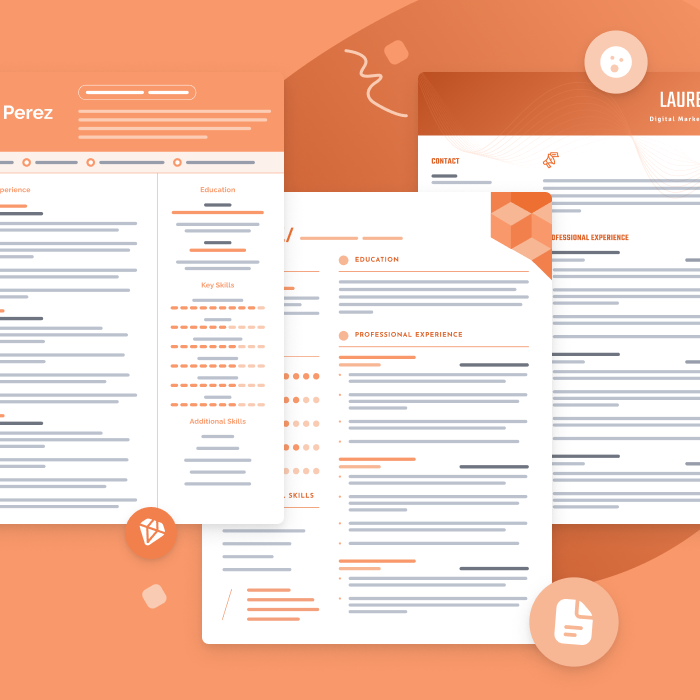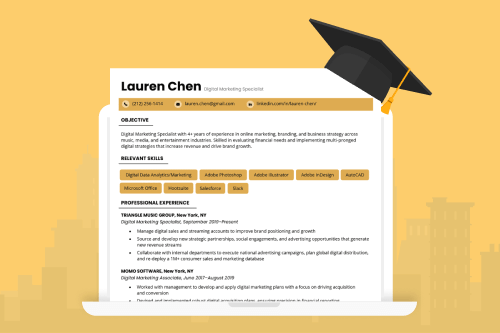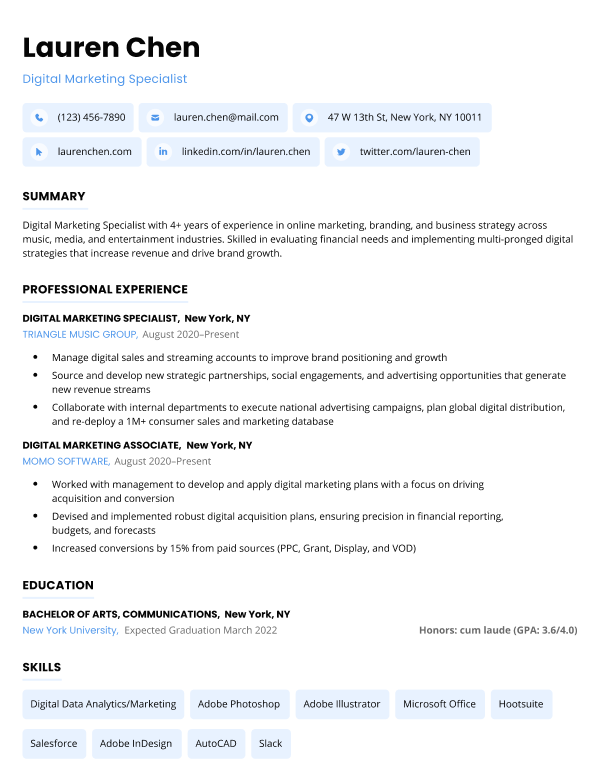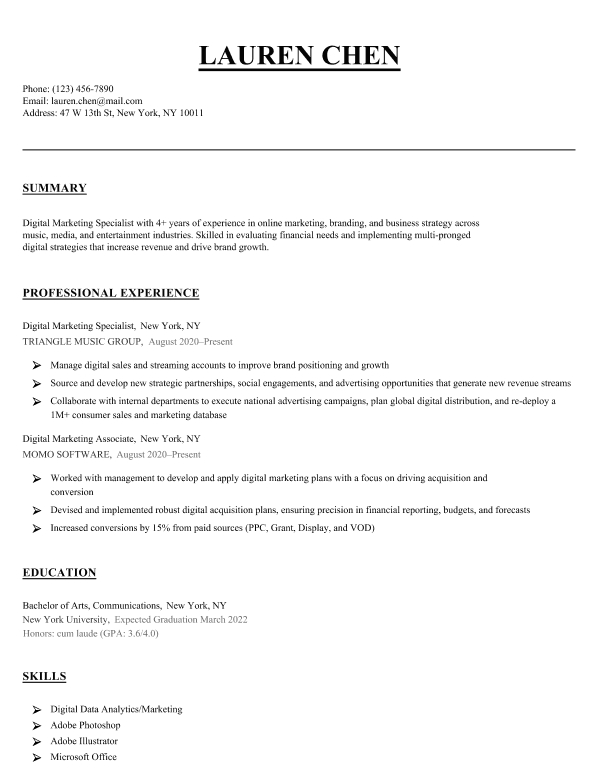How to List a Degree on a Resume
The thought of breaking into the professional world is daunting, but having a degree under your belt means you’re already at a competitive advantage.
However, when listing your degree on your resume, it’s important to include the correct information to ensure you clearly communicate your qualifications to hiring managers.
To get started, we’ll explain how to list an associate’s, bachelor’s, and master’s degree on a resume and how to list multiple degrees with examples.
To learn more about listing degrees on your resume, check out our video below to see our career expert Eva detail exactly how to add your education and what to include:
Our free-to-use resume builder can make you a resume in as little as 5 minutes. Just pick the template you want, and our software will format everything for you.
Should you list a degree on a resume?
Yes, you should list a degree on a resume if it’s relevant to the job you’re applying for or is a notable achievement.
Even if your degree isn’t relevant, however, listing it on your resume is still beneficial because hiring managers value individuals that possess strong educational backgrounds, so listing your degree can give you a competitive advantage over similarly qualified candidates.
How to properly list a degree on a resume
When you write a resume and want to list your degree, add it to the education section of the resume template you picked.
Include the following basic information about your degree:
- University name
- Dates of study
- Degree obtained
- Major
- Minor (if applicable)
Additionally, if you lack work experience and want to add extra details about your degree, include the following optional information:
- GPA (if 3.5 or above)
- Honors (if applicable)
- Relevant coursework
- Additional activities, such as volunteer work and school clubs
Here’s an example of how to list a degree on a resume:
UNIVERSITY OF MINNESOTA, Minneapolis, MN
Bachelor of Science in Business Administration / May 2019
- Honors: Cum Laude, GPA 3.9
- University softball club president
If you’re applying for a job while you’re currently completing a degree, knowing how to list an unfinished degree on a resume is important as it can still be a competitive edge when competing for a job with other applicants.
How to list multiple degrees on a resume
As you accumulate more education, you might have several degrees to list on your resume. If you have multiple degrees, list them in reverse-chronological order, with your most recent degree appearing first.
You should only list your degrees out of chronological order if one degree is more relevant to the job you want than the others. In this case, you should list your most relevant degree first.
For example, suppose an applicant has a Bachelor in Accounting and Finance and a Master of Business Administration, and they’re applying for a forensic accounting role. In that case, they should list their bachelor’s degree first.
Here’s an example of how to multiple degrees on a resume:
UNIVERSITY OF PENNSYLVANIA, Altoona, PA
M.S. Accounting
2014 – 2016ILLINOIS STATE UNIVERSITY, Chicago, IL
B.S. Accounting
2010 – 2014
How to write an associate’s degree on a resume
On a resume, your associate’s degree should be displayed as “Associate of” without the apostrophe. Otherwise, your associate’s degree should be listed on your resume the same way you’d list any other degree.
It’s generally best to write out the full name of your degree without abbreviating when you can. However, if you’re pressed for space, you can use standardized abbreviations that employers will recognize.
Here are six ways to abbreviate an associate’s degree:
- AA = Associate of Arts
- AB = Associate of Business
- ABA = Associate of Business Administration
- AAS = Associate of Applied Science
- AS = Associate of Science
- ASN = Associate of Nursing
Additionally, here’s an example of how to include an associate’s degree on your resume:
University of Providence
Great Falls, MT / 2021
AA Business AdministrationHonors: Cum Laude, GPA: 3.5
University softball captain
How to list a bachelor’s degree on a resume
You should list your bachelor’s degree along with your university’s name, dates of study, major, GPA (if a 3.5 or above), minor (if applicable), and honors and relevant coursework.
Similar to an associate’s degree, there are numerous ways to abbreviate different types of bachelor’s degrees. Here are six examples of how to abbreviate a bachelor degree on a resume:
- BA = Bachelor of Arts
- BBA = Bachelor of Business Administration
- BEd = Bachelor of Education
- BLA = Bachelor of Liberal Arts
- BSW = Bachelor of Social Work
- BS = Bachelor of Science
Remember, before using any abbreviations, keep the role you’re applying for in mind. For example, if you have a BSW and you’re applying for a job that involves social services, the hiring manager will likely be familiar with the abbreviation.
However, if you’re applying to a restaurant management position with a Bachelor of Social Work, the employer may not recognize the abbreviation ‘BSW.’ In this case, it’s best to write out the full name of your degree.
Here’s an example of how to list a bachelor’s degree on a resume:
RIVER BROOK UNIVERSITY
Chicago, IL / 2021
BBA / Minor: MarketingHonors: Cum Laude, GPA: 3.6

The best resume templates for 2024
One of the best ways to make your resume is by filling out one of our free resume templates. All our templates are designed by experts and free to download for Microsoft Word or Google Docs.
How to list a master’s degree on a resume
When listing a master’s degree on a resume, you should follow the same guidelines for listing bachelor and associate degrees by including the necessary details and any relevant coursework or honors.
Additionally, similar to associate and bachelor degrees, you can abbreviate when listing your master’s degree on your resume if needed.
Here are six examples of standard master degree abbreviations:
- MA = Master of Arts
- MS, MSc = Master of Science
- MBA = Master of Business Administration
- MIB = Master of International Business
- ME, MEng, = Master of Engineering
- MEd = Master of Education
You can choose whether or not to use periods in your abbreviations. For example, MA versus M.A., or M.Ed. versus MEd. Both styles are acceptable, but you should make sure you stick to one throughout your resume for consistency.
Here’s an example of how to list a master’s degree on a resume:
Florida State University
Gainesville, FL / 2018
MBAHonors: Magna Cum Laude, GPA 3.8
Relevant coursework: Supply Chain Management, Service and Operations Management, Business Ethics
Click to rate this article
4.2 Average rating
















